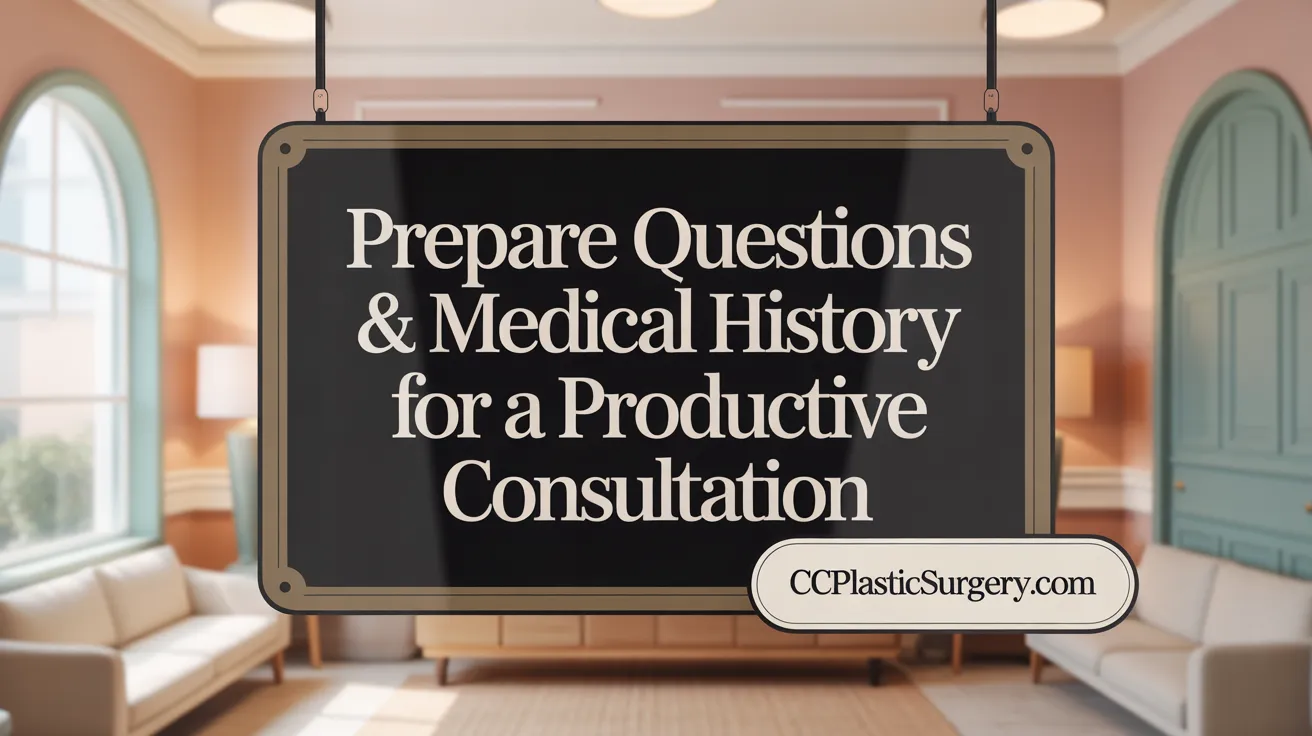
January 28, 2026
8 Proven Natural Ways to Plump Lips: Your 2026 Guide
Discover 8 proven natural ways to plump lips for a fuller, healthier pout. Explore safe, effective DIY methods and when to consider professional options.
Sep 4, 2025

Cosmetic surgery is a transformative decision that combines medical expertise with personal aspirations to enhance appearance and self-esteem. With a wide range of surgical and non-surgical procedures available, patients often have many questions about safety, risks, costs, and outcomes. This article addresses the top questions patients ask before cosmetic surgery and guides them through what to expect, how to choose a qualified surgeon, and how to prepare effectively for a successful procedure and recovery.

During a consultation, patients will discuss their aesthetic goals, motivations, and expectations. The surgeon will review medical history, conduct a physical examination relevant to the procedure, and evaluate the patient's overall health to determine candidacy. The surgeon then explains the available options, potential risks, recovery times, and expected results.
Patients are encouraged to view before-and-after photos of previous patients to gauge the surgeon’s style and results. The session typically lasts between 1 to 2 hours, providing ample time for thorough discussion. This step is vital for building understanding and comfort, helping patients feel confident before proceeding.
Prior to the consultation, patients should compile a list of questions about their procedure, surgeon’s experience, credentials, and legacy of results. It's equally important to prepare a detailed medical history, including current medications, allergies, past surgeries, and any health conditions.
This information helps the surgeon assess risks and tailor recommendations uniquely suited to each patient. Bringing a written list ensures no concern is overlooked during the discussion.
Clear, open dialogue is essential for setting realistic goals. Patients should feel comfortable sharing their concerns, expectations, and any fears about surgery. Surgeons should listen carefully, answer all questions honestly, and explain all options plainly.
Establishing mutual understanding fosters trust and guides decision-making, helping patients choose the best procedure for their needs and lifestyle.
The consultation includes reviewing medical history, a physical examination, and discussing procedural details. Surgeons usually show before-and-after photos of previous cases, explain different techniques, anesthesia choices, and recovery protocols.
Surgeons will also discuss costs, payment options, and financing plans, including arrangements like Care Credit. It’s recommended to meet with the surgeon who will perform the procedure and assess their professionalism, facility accreditation, and staff friendliness.
Viewing before-and-after images allows patients to evaluate the surgeon’s skill and aesthetic sense. It helps set realistic expectations by providing visual evidence of what the procedure can achieve.
Patients should request to see images of previous patients with similar concerns to theirs, verifying consistency in results.
Understanding the total cost—including surgeon’s fee, facility charges, anesthesia, and follow-up care—is crucial for financial planning. Patients are advised to inquire about available financing options like Care Credit or payment plans.
Discussing costs early prevents surprises and ensures that financial considerations align with the patient’s expectations and budget.
A vital part of consultation involves understanding the limitations and potential risks of the procedure. Surgeons explain possible outcomes, the likelihood of maintenance or additional procedures, and recovery timelines.
Openly discussing these topics helps patients develop a clear, achievable goal, reducing disappointment and increasing satisfaction with results.
| Aspect | Details | Additional Tips |
|---|---|---|
| Consultation duration | Usually 1-2 hours | Plan to allocate ample time and ask questions |
| Preparation | Medical history, questions | Write down concerns in advance |
| Key questions | Experience, credentials, risks | Bring a list and note responses |
| Visual aids | Before-and-after photos | Review multiple cases |
| Cost and financing | Total expenses, payment plans | Clarify with the office beforehand |
| Recovery expectations | Timeframes, activity restrictions | Follow surgeon’s post-op instructions |
Patients planning for cosmetic surgery should prioritize thorough research, clear communication, and realistic goals. An informed consultation makes a significant difference in surgical satisfaction and safety.

Patients should verify that their surgeon is certified by the American Board of Plastic Surgery or an equivalent reputable organization. Certification indicates extensive training in both cosmetic and reconstructive procedures and adherence to rigorous standards. You can confirm certification through official websites, which ensures your surgeon has the necessary expertise and ongoing commitment to their field.
Inquire about how often the surgeon performs the specific procedure you are considering. A surgeon with high volume in a particular surgery, like a facelift or liposuction, generally has more refined skills and better results. Reviewing the surgeon’s before-and-after photos can give you insights into their artistry and consistency.
Ensure that the surgical facility is fully accredited by recognized organizations. Accredited outpatient surgery centers and hospitals meet strict safety standards. Ask about the facility’s certifications and the qualifications of staff members, including anesthesiologists, to guarantee a safe environment.
Discuss anesthesia options such as general anesthesia or MAC sedation, and confirm the surgeon’s experience with each. It’s crucial to choose options tailored to your needs. Additionally, ask if the surgeon holds hospital privileges, which implies a higher level of accountability and expertise.
A trustworthy surgeon should openly discuss potential risks, expected results, complications, and costs. Viewing before-and-after photos helps manage expectations. Good communication ensures that you feel comfortable and well-informed, fostering a partnership aimed at achieving your aesthetic goals.
| Question | What to Ask | Why It Matters |
|---|---|---|
| Certification verification | Are you certified by the American Board of Plastic Surgery? | Ensures qualifications and ongoing education |
| Experience in specific procedures | How many times have you performed this procedure? | Indicates expertise and skill level |
| Facility safety standards | Is your surgical facility accredited? | Guarantees adherence to safety regulations |
| Anesthesia methods | What types of anesthesia do you use? | To determine safety and comfort options |
| Surgeon’s hospital privileges | Do you have privileges at a hospital? | Reflects credibility and access to emergency support |
| View past work | Can I see before-and-after photos of your patients? | Helps assess aesthetic results and surgeon’s style |
| Risks and realistic expectations | What are the possible risks and complications? | Important for informed decision-making |
Focusing on these questions ensures you select a qualified, experienced, and trustworthy surgeon, ultimately leading to safer procedures and more satisfying results.
 When considering cosmetic surgery like breast augmentation, tummy tuck, or facelift, patients should prepare by asking focused questions that address their specific concerns and ensure they choose the right surgeon.
When considering cosmetic surgery like breast augmentation, tummy tuck, or facelift, patients should prepare by asking focused questions that address their specific concerns and ensure they choose the right surgeon.
Questions to Ask Before Breast Augmentation Surgery Patients should ask about the surgeon’s certification and experience, particularly in breast procedures. Additionally, it’s important to discuss the types of implants available—such as saline or silicone—and their sizes. Patients should also inquire about incision options and implant placement techniques, as well as the entire surgical plan, including anesthesia options.
Recovery expectations and potential complications should also be discussed. Cost transparency and options if the patient is dissatisfied later are essential. Asking for before-and-after photos of previous breast augmentation cases can help set realistic expectations.
Questions to Ask a Plastic Surgeon About Tummy Tuck Procedures For tummy tucks, patients need to confirm the surgeon’s qualifications, experience, and specific surgical techniques. Clarify what kind of scars will result and whether these will be visible. It’s also important to understand how future pregnancies might affect the results and what post-operative care involves.
Viewing before-and-after photos of tummy tuck patients is strongly recommended to assess the surgeon's skill and aesthetic sense. Patients should inquire about the expected recovery timeline, including activity restrictions and how to care for scars.
Questions to Ask Before a Facelift Procedure Candidates should confirm that their surgeon is board-certified and has hospital privileges for performing facelifts. Discussing candidacy based on skin condition, age, and overall health is essential.
Surgeons should explain different surgical methods and anesthesia options, and share realistic recovery timelines. Patients should view before-and-after photos to gauge expected outcomes, and discuss post-operative care support. Asking about potential risks and solutions for unsatisfactory results can help ensure informed decision-making.
| Procedure Type | Main Questions | Additional Considerations |
|---|---|---|
| Breast Augmentation | Certification, implant types, incision options, costs | Recovery time, complications, surgeon’s experience |
| Tummy Tuck | Surgical techniques, scar location, pregnancy effects | Post-op care, scars, future pregnancies |
| Facelift | Certification, techniques, ideal candidates | Risks, recovery, before-after comparisons |
Choosing a surgeon specialized in your desired procedure, reviewing their portfolio, and having thorough consultations will contribute significantly to satisfying results and safe surgery experiences.

Patients often ask about procedure options, risks, recovery timelines, safety measures, how long results last, and the qualifications of their surgeon. It’s crucial for patients to understand potential complications and have clear, realistic expectations. Knowing these details helps ensure informed decisions and better satisfaction with the outcome.
Every surgical procedure involves some level of risk. Common complications include wound healing issues, blood clots, infections, anesthesia reactions, scarring, and nerve damage. Surgeons should openly discuss these risks during consultations and explain how they manage and minimize them.
Recovery times vary depending on the procedure. For most surgeries, patients should avoid strenuous activities and exercise for about 2-3 weeks. Specific surgeries like tummy tucks may require up to three months for rotational activities. Patients are typically advised to rest, follow post-op instructions, and gradually resume normal activities.
Patients can enhance healing by adhering strictly to medication schedules, maintaining proper nutrition, staying well-hydrated, and following their surgeon’s instructions. Proper care reduces swelling, minimizes complications, and helps achieve optimal results.
Results typically last from 10 to 30 years, largely depending on age, lifestyle choices, and bodyweight management. Maintaining a stable weight and adopting a healthy lifestyle can prolong the effects of the procedure.
Understanding what a procedure can and cannot do prevents disappointment and ensures satisfaction. Lifestyle factors like smoking, excessive alcohol consumption, and poor diet can negatively impact results and healing.
Post-surgical follow-ups are essential to monitor healing, address any complications, and plan further treatments if needed. Good aftercare, including proper wound care and adherence to activity guidelines, supports healing and sustains results.
| Aspect | Details | Additional Notes |
|---|---|---|
| Risks | Wound healing issues, blood clots, infections, anesthesia reactions, scarring, nerve damage | Surgeons should discuss and explain risk management strategies |
| Recovery | Usually 2-3 weeks for basic activities, up to 3 months for more strenuous activities | Following post-op instructions accelerates healing |
| Longevity | 10 to 30 years, influenced by lifestyle | Ongoing healthy habits extend results |
| Follow-up | Initial visit the day after surgery, then at 1 week, 1 month, 3 months, 6 months, and annually | Ensures proper healing and long-term satisfaction |
| Preparation | Avoid certain medications, stay within target weight, follow physician advice | Proper pre-op planning minimizes complications |
Patients should always consult with their surgeon about any specific concerns and ensure they understand all aspects of their procedure. A transparent discussion fosters trust and helps patients feel more confident throughout their cosmetic journey.

Consultation fees generally range from $80 to $125. During this appointment, the surgeon will evaluate your goals, medical history, and explain potential procedures. Afterward, a detailed surgical quote is provided, which includes various costs such as surgeon fees, anesthesia, facility charges, and post-operative care. Understanding the total expenses upfront helps in proper financial planning.
Many patients find it helpful to consider financing options like Care Credit or other medical credit plans. These programs allow manageable installment payments, making elective procedures more accessible. It’s advisable to inquire about financing during initial consultations to identify suitable payment plans.
Choosing the right surgeon involves researching and comparing several qualified professionals. Patients should review each surgeon’s experience, credentials, before-and-after photos, and patient reviews. Comparing surgeons ensures you select someone whose aesthetic style aligns with your expectations and who has a proven track record for safety and excellent outcomes.
Reviewing before-and-after images provides insight into a surgeon’s aesthetic sense. It’s important to choose a surgeon whose results resonate with your personal preferences. Additionally, ask about patient satisfaction rates and how they measure success to gauge the surgeon’s commitment to achieving desired results.
Feeling comfortable discussing your concerns and goals is vital. Trusting your surgeon and staff fosters open communication, which is essential for setting realistic expectations and ensuring your needs are understood. Don’t hesitate to ask questions and express doubts during consultations.
Always verify that your surgeon is certified by recognized boards such as the American Board of Plastic Surgery. Certification indicates they meet rigorous training and ethical standards. Confirm credentials through official websites to ensure you’re working with a qualified professional.
Procedures should be performed in fully accredited outpatient surgical centers or hospitals. Accreditation ensures the facility adheres to strict safety standards. Additionally, observe the professionalism of the staff and the cleanliness of the environment during your visit, as these are indicative of the overall quality of care.
| Topic | Details | Additional Notes |
|---|---|---|
| Consultation Costs | Usually $80-$125, includes evaluation and quote | Important for initial planning |
| Financing Options | Care Credit, installment plans | Makes procedures financially accessible |
| Surgeons Comparison | Review credentials, photos, reviews | Ensures compatible style + experience |
| Credential Verification | Certification by ABPS or equivalent | Confirms qualified surgeon |
| Facility Standards | Accreditation, staff professionalism | Ensures safety and quality |
Making an informed choice about your cosmetic procedure involves careful financial planning and selecting a reputable, qualified surgeon. By verifying credentials, exploring financing, and assessing both the surgeon’s and facility's professionalism, patients can confidently proceed with their aesthetic goals.
Choosing to have cosmetic surgery is a significant and personal decision that requires thorough research, careful surgeon selection, and open communication. Prospective patients should prepare well for consultations, ask detailed questions about surgeon qualifications and procedure specifics, understand risks and recovery expectations, and plan financial aspects carefully. A board-certified, experienced surgeon working in an accredited facility will help ensure safety and satisfactory results. Ultimately, clear information and realistic goals empower patients to confidently achieve the enhancements they desire while prioritizing health and well-being.

January 28, 2026
Discover 8 proven natural ways to plump lips for a fuller, healthier pout. Explore safe, effective DIY methods and when to consider professional options.

January 28, 2026
Ensuring Excellence: The Rigorous Safety Protocols Behind Accredited Surgical Suites

January 27, 2026
Explore radiesse before and after results from real patients. See how this filler restores volume and smooths wrinkles—click to view.